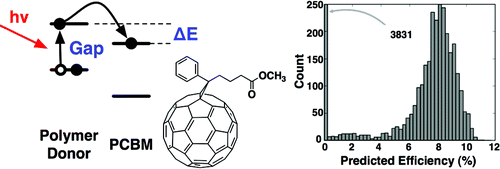Computational Design and Selection of Optimal Organic Photovoltaics
Noel M. O’Boyle, Casey M. Campbell, Geoffrey R. Hutchison. “Computational Design and Selection of Optimal Organic Photovoltaics” J. Phys. Chem. C 2011 115(32) 16200–16210 Available Online (ACS). Also available through U. C. Cork. (Open Access).
 Conjugated organic polymers are key building blocks of low-cost photovoltaic materials. We have examined over 90000 copolymers using computational predictions to solve the “inverse design” of molecular structures with optimum properties for highly efficient solar cells (specifically matching optical excitation energies and excited-state energies). Our approach, which uses a genetic algorithm to search the space of synthetically accessible copolymers of six or eight monomer units, yields hundreds of candidate copolymers with predicted efficiencies over 8% (the current experimental record), including many predicted to be over 10% efficient. We discuss trends in polymer sequences and motifs found in the most frequent monomers and dimers in these highly efficient targets and derive design rules for the selection of appropriate donor and acceptor molecules. We show how additional computationally intensive filtering steps can be used, for example, to eliminate targets likely to have poor hole mobilities. Our method effectively targets optimum electronic structure and optical properties far more efficiently than time-consuming serial experiments or computational studies and can be applied to similar problems in other areas of materials science.
Conjugated organic polymers are key building blocks of low-cost photovoltaic materials. We have examined over 90000 copolymers using computational predictions to solve the “inverse design” of molecular structures with optimum properties for highly efficient solar cells (specifically matching optical excitation energies and excited-state energies). Our approach, which uses a genetic algorithm to search the space of synthetically accessible copolymers of six or eight monomer units, yields hundreds of candidate copolymers with predicted efficiencies over 8% (the current experimental record), including many predicted to be over 10% efficient. We discuss trends in polymer sequences and motifs found in the most frequent monomers and dimers in these highly efficient targets and derive design rules for the selection of appropriate donor and acceptor molecules. We show how additional computationally intensive filtering steps can be used, for example, to eliminate targets likely to have poor hole mobilities. Our method effectively targets optimum electronic structure and optical properties far more efficiently than time-consuming serial experiments or computational studies and can be applied to similar problems in other areas of materials science.